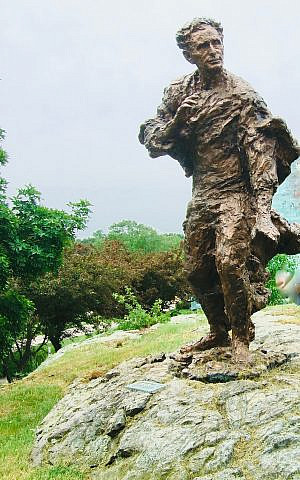-
NEW! Get email alerts when this author publishes a new articleYou will receive email alerts from this author. Manage alert preferences on your profile pageYou will no longer receive email alerts from this author. Manage alert preferences on your profile page
- Website
- RSS
Weimar Americans of the Tikkun Olam Persuasion
From the mid-19th century down to the end of Weimar Germany in 1933, some German Jews took positions to separate themselves from Jewish peoplehood, in order to confirm – to others, and to themselves – that they were really just part of the German people. So they cut out from the Reform Jewish prayer book the messianic hope for the ingathering of the Exiles, “next year in Jerusalem” and the return to the Land of Israel. To make sure that everybody was satisfied that they held no allegiance to a Jewish homeland, or overly strong ties of peoplehood, they claimed only common membership in a religion, and they re-characterized the Jewish religion as “ethical monotheism”. Removing even the word “Jewish”, they called themselves “Germans of the Mosaic persuasion”.
For many educated German Jews, the apparent pathway to acceptance in German society was a complete identification with elite German culture, from writing your doctoral thesis on Goethe, as did Walter Benjamin in 1919, writing your doctoral thesis on St. Augustine, as did Hannah Arendt in 1929, or playing Beethoven piano sonatas, even if your right arm was amputated in the Great War, as did Ludwig Wittgenstein’s younger brother, Paul.
Likewise, many secular liberal American Jews don’t think of themselves as “American Jews” but as Americans, of Jewish descent. Not that they deny the fact of their Jewish parents and grandparents. But for their Jewish identity, they strip out of Judaism not only ritual observance, and knowledge of Jewish texts, history and philosophy, but also Zionism, nationalism and ancient connections to the land of Israel. They identify with select universalist quotes from the Prophets. But their attitude to the fact of the existence of the State of Israel is not joy at the messianic hope fulfilled of Jewish sovereignty and the ingathering of exiles – both of which actually happened, just as the Prophets prophesied. It is discomfort.
Most American Jews don’t see themselves as being “exiles”. Many actually consider the Diaspora to be a superior form of being Jewish – more refined, since one is not required to deal with the dirty undersides of sovereignty and political responsibility, such as the need for a strong deterrent military defense force.
Some American Jews increasingly feel Israel and Israelis are too “Middle Eastern” – too nationalist, religious, hawkish. These American Jews see themselves as a better kind of Jews: “Americans of the tikkun olam persuasion”. Unlike some German Jews of a century ago, they would never call themselves “Americans of the Mosaic persuasion”. Firstly, that whole Moses story is SO nationalistic, as it involved leading a People to the Land of Israel. Then there’s the whole idea of a “Promised Land” – very problematic; there is even discomfort with the Exodus story, since it resulted in the death of innocent Egyptians; and Moses was totally implicated in the problematic concept of the Children of Israel being God’s chosen people. So “Mosaic persuasion” is off the table.
Many cannot even accept the more limited elite German Jewish definition of Judaism as being “ethical monotheism”. Not because they have anything against being “ethical”, God forbid, but because monotheism implies not just a single God, but the concept of God altogether. Which is OK for Muslims. But very regressive for Jews. And anyway, humans invented God. And doesn’t Judaism teach we should not worship the product of human creation?
So what is the essence of Judaism with which they DO fervently and devoutly identify? Tikkun olam, literally “repairing the world”, defined not as “improvement”, “self-improvement” or other of its original meanings, but basically as “social justice”. Out of the complex multifaceted Jewish tradition of law, practice, study, mysticism, peoplehood, a vast library of Jewish texts and millennia of history, they take this one strand of tikkun olam, and define it as social justice. How fortuitous, and how convenient, that this form and expression of Judaism is anti-nationalist, anti-chosen people, “spiritual-not-religious”, and involves a God-free pursuit of “social justice” which just happens to chime perfectly with the new orthodox woke ideology of America’s educated cultural and political elites.
One fly in the ointment is that some woke ideologues see Jews – even Jews of the tikkun olam persuasion – not as part of an ancient minority civilization but merely as a particularly privileged subset of privileged whites, and therefore a group at the bottom of the current intersectional pyramid. And to make matters worse, these rich white Jews are associated with the worst of the worst – Israeli Jews, which in the new caste system are practically Untouchables – not just white but settler, colonial, and oppressors.
If the elite’s mental framework for seeing modern Israel’s complex multifaceted society, the Israel-Palestine conflict, and the Jewish-Muslim relationship, as nothing more than “white European colonial settlers” against “black Palestinian indigenous victims”, the best way liberal Jews can fit in is if they publicly profess not only their distance from Israel and its policies, but also from the centrality of Israel and Jewish peoplehood. Some adopt even more extreme woke outreach, like Peter Beinart, who goes so far as to identify Jewish Israel as Egypt, and the Palestinians as the Hebrew slaves.
All of this is exasperated by the new ecosystem of social media in which we now live, what Walter Benjamin might today call “Politics in the Age of Digital Reproduction”. As Jonathan Rauch explains in his book “The Constitution of Knowledge”, humans are social animals. Knowledge and belief (like language) is social. Believing is belonging. So what matters is not what I believe, but what “we” believe. “We” being “Us”, versus “Them”.
That is why we are so concerned to display our beliefs. We are obsessed with our reputations. Contrary to techno-Utopian dreams, social media did not become a place for open discussion and reasoned debate over diverse viewpoints. Instead, social media became a forum in which to socially display to others (especially to those who are in the “Us” community) our own personal virtue, beliefs and loyalties.
So it seems that many elite educated American Jews are making the move made by elite educated German Jews a century and more ago; to prove they belong to their host society with which they identify by distancing themselves from Jewish peoplehood, the Land of Israel and Zionism. But interestingly, among German Jews a century ago in America, there was a striking counterexample.
Consider Louis Brandeis. Like fellow German Jews Walter Benjamin or Hannah Arendt, Brandeis, born in Louisville, Kentucky in 1856, grew up wealthy and educated. Even before huddled masses of East European Jews began arriving at Ellis Island, Brandeis attended Harvard Law School, graduating as valedictorian at the age of 20 with the highest grade point average in the law school’s history. Brandeis was the archetypal American “smart Jewish boy” that every non-German Pale of Settlement American Jewish mother dreamed of for her son on the day of his circumcision.
And when, during the First World War, President Woodrow Wilson appointed Brandeis to the US Supreme Court – the very first Jew! – it filled every American Jewish parent‘s heart with pride, and the hope that their child too could be a Supreme Court Justice.
But during the First World War, there was another signal contribution of the American German-Jewish elite to the larger body of American Jews. When the Great War broke out between, on one side, Germany, and German-speaking Austro-Hungary, and Turkey – their armies included many Jewish soldiers; and on the other side of the battlefield, England and her Empire and Dominions, including Canada and Australia, France, Belgium, Italy – their armies also included many Jewish soldiers. And so the center of the pre-Balfour Declaration Zionist enterprise, which had been headquartered in Berlin, had to move to neutral America, the better to protect the nascent Yishuv in Palestine.
And who better to take the reins from Berlin, to lead the enterprise, than Louis Brandeis, himself the son of German-speaking Jews? And so, just weeks after the outbreak of the war, on August 20, 1914, when “the Provisional Executive Committee for Zionist Affairs” was established in New York, the country’s most famous lawyer became President. And he remained honorary leader of the world Zionist movement even when appointed in 1916 by President Woodrow Wilson as a US Supreme Court Justice.
“The work for Zionism” Justice Brandeis wrote to his mother-in-law on Dec 20, 1917 “has seemed to me, on the whole, the most worthwhile of all I have attempted.” Between 1914 and 1921, during his formal leadership of the Zionist movement in America, Brandeis donated over $171,000 (about $2.5 million in 2022 dollars). He toured Palestine in 1919 and was elected honorary president of the World Zionist Organization in 1920.
As Jonathan Sarna notes, “Before Brandeis, Zionism had faced substantial opposition from those who claimed it was “un-American”. The Union of American Hebrew Congregations, for example, declared in 1898 that “we are unalterably opposed to political Zionism…America is our Zion… The mission of Israel is spiritual, not political.” They feared Zionism would raise embarrassing questions of dual loyalty…”
For Brandeis, his nomination to the Court was a vindication of his Zionist stance; he cited it as evidence that “in the opinion of the President there is no conflict between Zionism and loyalty to America.”
In his most famous quote on the topic, Brandeis said, “To be good Americans we must be better Jews, and to be better Jews, we must become Zionists.”
In 1933, with the collapse of the Weimar Republic, over 100,000 German Jews fled Germany for British Mandatory Palestine. With the change in Germany’s political environment, they no longer thought of themselves as “Germans of the Mosaic persuasion”.

Statue of Justice Louis D. Brandeis on campus of Brandeis University, Waltham, Mass. Photo by Benjamin Rubin
Today in America, in the face of an increasingly difficult political environment in which secular liberal Jews find themselves, a significant majority of the American Jewish community continues to be strongly interested in the State of Israel’s well-being, feels part of a global Jewish peoplehood, and is concerned about the threat of antisemitism, including its 21st century manifestation as anti-Zionism. Though this may cause tension and even discomfort in their position, perhaps they can be inspired by the forthright Zionist stance of Justice Brandeis.
Related Topics



